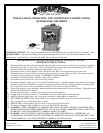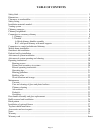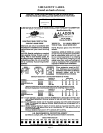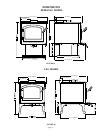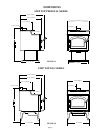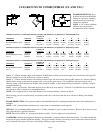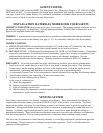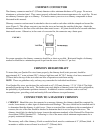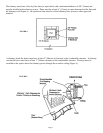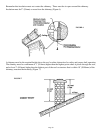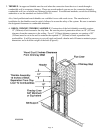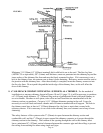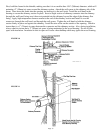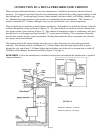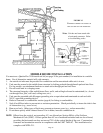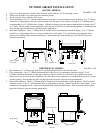SAFETY LISTING
The Quadra-Fire 3100 is listed by OMNI-Test Laboratories, Inc. , Beaverton, Oregon, to UL 1482-83, (UM)84
HUD and ULC S627. It is also approved for mobile home installations with outside combustion air in the U.S.
(see pages 15 and 16 for further details). For residential installations in Canada without an outside combustion
air kit, a source of fresh air into the room must be provided.
INSTALLATION MATERIALS NEEDED FOR YOUR SAFETY
CHIMNEY CONNECTOR (also known as flue pipe or stove pipe): The chimney connector joins the stove to
the chimney (see page 8). It should be 6” (152mm) minimum diameter 24 MSG black or blued steel, or an
approved air-insulated double wall venting pipe.
THIMBLE: A manufactured or site-constructed device installed in combustible walls through which the
chimney connector passes to the chimney (see page 11-13). It is intended to keep the walls from igniting.
CHIMNEY SYSTEMS:
A. APPROVED MASONRY (see specifications on pages 8-13) with at least 5/8” (16mm) fire clay lining
joined with refractory cement or other listed system suitable for use with wood stoves.
B. PREFABRICATED 6" (152mm) listed high temperature (UL 103HT or ULC 629M) chimney. Components
required by manufacturers for installation such as the chimney support base, firestop (as appropriate), attic
insulation shield, insulated tee, etc., are necessary to assure a safe chimney installation. Use only
components manufactured for the chimney. Chimney installation should meet NFPA 211 standards.
FIRE SAFETY: To provide reasonable fire safety, the following should be given serious consideration:
1. Install at least one smoke detector on each floor of your home to ensure your safety. They should be
located away from the heating appliance and close to the sleeping areas. Follow the smoke detector
manufacturer’s placement and installation instructions, and be sure to maintain regularly.
2. A conveniently located Class A fire extinguisher to contend with small fires resulting from burning embers.
3. A practiced evacuation plan, consisting of at least two escape routes.
4. A plan to deal with a chimney fire as follows:
In the event of a chimney fire:
A. Notify fire department
B. Prepare occupants for immediate evacuation.
C. Close all openings into the stove.
D. While awaiting fire department, watch for ignition of adjacent combustibles from overheated stove pipe,
hot embers or sparks from the chimney.
VENTING SYSTEM
The venting system consists of a chimney connector and a chimney. These get extremely hot during use.
Temperatures inside the chimney may exceed 2000°F (1100°C) in the event of a creosote fire. To protect
against the possibility of a house fire, the chimney connector and chimney must be properly installed and
maintained. An approved thimble must be used when a connection is made through a combustible wall to a
chimney. A chimney support package must be used when a connection is made through the ceiling to a
prefabricated chimney. These accessories are absolutely necessary to provide safe clearances to combustible
wall and ceiling material. Follow venting manufacturer’s clearances when installing venting system.
This stove may be connected to a lined masonry chimney or a listed high temperature prefabricated approved
metal chimney. Do not connect it to a chimney serving another appliance. To do so will affect the safe
operation of both appliances.
Page 7



